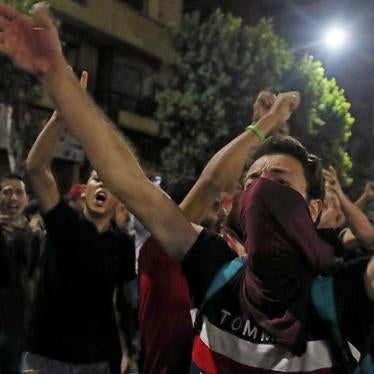February 21, 2020
To: President Michel
European Council Rue de la Loi 175 B-1048 Bruxelles
cc: High Representative Borrell
European Commission Rue de la Loi 200 1000 Bruxelles
cc: Commissionner Várhelyi
European Commission Rue de la Loi 200 1000 Bruxelles
Re: Human Rights in Egypt
Dear President Michel,
Dear High Representative Borrell, Dear Commissioner Várhelyi,
We are writing to urge you to lead a comprehensive review of the EU’s relations with Egypt in light of the sustained and unprecedented crackdown on human rights in the country. We call on you to devise and implement a holistic and result-oriented strategy, using all instruments at the EU’s disposal to urgently halt this abusive trend and better engage with Egypt on protecting human rights, promoting the rule of law and combatting impunity.
In September 2019, thousands of peaceful protesters across Egypt took to the streets to demonstrate against high-level corruption in government and in the military, as well as austerity. The Egyptian authorities responded with a massive wave of arrests, in which thousands of peaceful protesters and citizens suspected of dissent were arbitrarily detained within a matter of weeks – more than 4,000 according to the Egyptian Commission for Rights and Freedoms. These arrests were accompanied by a violent crackdown on journalists, human rights defenders (HRDs), trade unionists, NGOs, and peaceful opposition party figures. These arrests came as part of a pattern of brutal attacks against civil society and suppression of fundamental rights and of all forms of dissent which has significantly worsened under President al-Sisi’s rule.
Sadly, the severe deterioration of human rights in Egypt was met by silence from the EU, mostly due to EU member states’ divisions which have made it nearly impossible to secure EU statements of concern, let alone to adopt more persuasive measures. The EU’s passivity regarding the latest wave of government violence, arrests and intimidations prompted the European Parliament to call for a comprehensive review of the EU’s relations with the country, which we agree is urgently needed given the failure of the current approach to produce any meaningful results. Specifically, we urge the EU to:
1) Reaffirm that ‘human rights, democracy and the rule of law’ are central elements in the EU- Egypt Partnership Priorities and ensure proper implementation of these existing commitments: The 2017-2020 Partnership Priorities state that the EU’s relations with Egypt are guided by a shared commitment to the universal values of democracy, the rule of law and respect of
human rights’. In 2020, when negotiating new Partnership Priorities with Egypt, the EU should insist on placing these values at the centre of its partnership and aim at obtaining stronger and more concrete commitments from Egypt on these issues, as well as ensure better implementation given Egypt’s patent failure to deliver on these under the current cycle. The priorities should also stress the importance of independent civil society as an implementing partner and the need for these actors to be able to receive funding for their human rights and development activities without undue restrictions. The EU should further support Egyptian HRDs facing prosecution by continuing to observe their trials and delivering upon its commitments outlined in the EU guidelines on HRDs and issue decisive and robust public condemnations in response to human rights violations by the Egyptian authorities.
2) Conduct a public and comprehensive review of the European Commission’s budget support to Egypt and ensure that EU funds do not contribute to human rights violations: While the disbursement of these funds was frozen after the 2013 Foreign Affairs Council Conclusions, it has proven difficult both for civil society and for MEPs to access detailed information on the current situation regarding budget support for Egypt. This prevents public scrutiny of the use of the EU budget, and goes against the principles of transparency and accountability. It is essential that the European Commission publishes clear and comprehensive information on the financial support it provides to third countries, to dispel doubts and clarify the European Commission’s role. This information should specify that the disbursement of EU funds does not fuel human rights abuses and is not used to commit human rights violations by the partner state. The EU should also ensure that EU-Egypt cooperation in the field of migration strictly complies with international human rights standards. Any EU funding in this field must be equipped with a human rights monitoring mechanism and safeguards to ensure that no EU funding benefits bodies or institutions involved in or contributing to human rights violations in Egypt.
3) Ensure that human rights and the involvement of independent civil society are key components of the EU's financial and economic engagement with Egypt: Given that Egypt has obviously regressed between 2017 and 2020 in terms of human rights, democracy and rule of law, the EU should not rely solely on Neighborhood Policy mechanisms. The Union should ensure that respect for human rights and the involvement of independent civil society organizations are key components in all areas of the EU’s cooperation with Egypt—from trade negotiations to the lending strategies of the European Bank for Reconstruction and Development (EBRD)
4) Ensure public and transparent reporting on the state of EU Member State arms exports to Egypt and the full implementation of EU export controls for goods that could be used for internal repression, torture or capital punishment: Many EU Member States have not complied with their commitments laid out in the 2013 Foreign Affairs Conclusions regarding the export of equipment which might be used for internal repression in Egypt, in line with Common Position 2008/944/CFSP. Based on the EU’s own reporting, at least twelve EU Member States have supplied military or security equipment to Egypt since 2013, which could be used for internal repression. Moreover, human rights organisations have continued to document the use of European supplied military or security equipment to commit violations against peaceful protestors and bystanders, including during the September 2019 crackdown on protests and in military operations in North Sinai. Meanwhile surveillance technology has been used to repress civil society including human rights defenders.
5) Step up the EU’s engagement on Egypt at the UN Human Rights Council: The EU should reinforce its work addressing the human rights situation in Egypt at the UN Human Rights Council, which has been done through Agenda Item 4 statements for several years. The paragraph on Egypt frequently begins with recognition of Egypt’s “efforts to counter terrorism”; this language is in need of revision given that Egypt regularly justified its increasing repression against HRDs, journalists and dissent at large under the pretext of “counter-terrorism., while committing serious abuses as part of the ongoing campaign in North Sinai. In view of escalating violations in Egypt and its lack of constructive cooperation with UN human rights mechanisms, the EU should step up its scrutiny in 2020 by systematically raising the human rights situation in Egypt during general debates under item 4 of the UN Human rights Council, including the misuse of counter-terrorism legislation to target human rights defenders and the prevailing culture of impunity for human rights violations. The EU and its Member States should also raise individual cases of human rights defenders facing acts of intimidation and reprisals for engaging with the UN, including at the High-Level Segment of the UN Human Rights Council.
6) Confront Egypt’s attempts to undermine the effectiveness and independence of UN and other international human rights mechanisms: Egypt regularly seeks to undermine the integrity and credibility of the UN Special Rapporteur on the promotion and protection of human rights while countering terrorism. Under the pretext of addressing the rights of victims of terrorism, Egypt has sought to divert attention and resources away from the human rights violations occurring in the context of state counter-terrorism measures, focusing instead on the ‘effects of terrorism on human rights and even presenting the State itself as a victim of human rights violations. These efforts are geared towards undermining the existing institutional framework while distracting from Egypt’s and other States’ misuse of counter-terrorism to crackdown on the human rights of individuals and the activities of civil society at home. Moreover, the appointment of Egypt as co-lead of the ongoing review of the UN’s Global Counter-Terrorism Strategy (UNGCTS), puts at risk the existing human rights provisions in the strategy. The EU and EU member states should use their position at the UN to counter Egypt’s harmful efforts, including by ensuring that the 2020 review of the UNGCTS addresses the shortcomings in the implementation of the strategy’s human rights pillar (pillar IV).
7) Put high-ranking Egyptian officials on notice that the EU stands ready to address serious and systemic human rights violations, ensure accountability and restore respect for human rights in light of the European Parliament resolution of 24 October 2019.
We would also like to request a joint meeting with you in order to discuss these issues further. We look forward to your response, and remain at your disposal to provide any further information.
Best regards,
Amnesty International
Cairo Institute for Human Rights Studies
Euromed Rights
Human Rights Watch
International Federation for Human Rights (FIDH) Reporters without Borders (RSF)
Solidar








